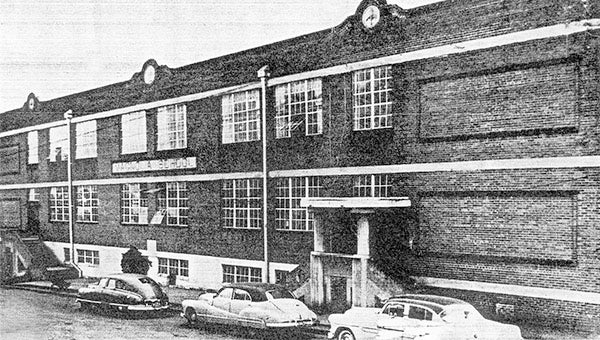Effort under way to make Magnolia Avenue High School a site of honor
Published 7:57 pm Friday, September 16, 2016
Perched at the top of Bowman Street, the once thriving Magnolia Avenue High School, now sits deserted. At one time it was the only school in Vicksburg that offered a secondary education to African Americans, and in 1940 it was considered as one of the 16 most important black high schools in the southeast, and thus was chosen to participate in a study funded by the Rockefeller Foundation’s Center.
On Thursday at 5:30 p.m. at the Warren County Vicksburg Public Library, Dr. Craig Kridel, who is the curator of the Museum of Education at the University of South Carolina, will speak on his 10 year research project about the Secondary School Study funded by the foundation, which includes Magnolia Avenue High School.
Kridel is also hoping to generate interest from local civic and educational leaders to consider establishing a formal site of honor for the legacy of Magnolia Avenue High School.
“While teachers and students of the Secondary School Study endured injustices and discrimination during their high school years, these remarkable schools built communities of hope and strength. Magnolia Avenue High School is a testimony to Vicksburg and, of all the participating schools, I view Magnolia Avenue as one of the three most significant and most important sites in the study,” Kridel said.
The Secondary School Study, which was conducted more than 75 years ago, integrated an experimental form of teaching into the classrooms, Kridel said, which was considered to be a “progressive” method of educating students.
The definition of this “progressive” method of education meant that classrooms were not solely teacher centered, but it also encouraged participation from the students.
“These schools believed in drawing upon the interest of the child, but also their needs as well,” Kridel said.
“Magnolia Avenue High School was viewed as a remarkable school, but they were selected in part because of the faculty’s willingness to experiment with the curriculum, and Magnolia Avenue prized what was called teacher student planning,” Kridel said.
“Examples of this was evident not just in the classroom, but in school assemblies where the entire school would come together as a community, and students would talk and present and show what they were learning and by showing that, it showed it was important to them.”
J.G.H. Bowman, who was the principle of Magnolia Avenue High School, was another component as to why the school was selected, Kridel said.
“Clearly the people in Mississippi held Mr. Bowman in high regard,” Kridel said, and because of his reputation, field representatives from the Rockefeller Foundation’s Center came specifically to Vicksburg to observe his school.
“They considered a number of schools in every state, but they selected Magnolia in part because of their respect for Mr. Bowman.”
Following Bowman’s death Magnolia Avenue changed it’s name to Bowman High School to honor the educator, but it was still referred to as Magnolia Avenue High School in the Secondary School Study.
Kridel added that while the representatives were at Magnolia, it was also evident the teachers were dedicated and after being selected many went on to attend workshops that were held in conjunction with the study.
“By being part of the project the teachers had opportunities they would not have otherwise had,” Kridel said.
“Mr. Buck, the social studies and history teacher, went to a six-week 1940 Hampton workshop where they where developing curricular programs.”
Some of the programs implemented at Magnolia during the study, Kridel said focused attention on the Vicksburg community.
Katie Washington, who became the principle following Bowman’s death, taught a sociology class, and after attending a 1940 Atlanta Workshop, she had her students work with the city counsel to try and obtain funding for a federal housing project for Vicksburg, Kridel said.
The next year the class chose to get first-hand information about diseases, which prevent the development of healthy bodies.
“The study finally led to a desire to know more about venereal diseases — the causes, dangers, controls prevalence among Negroes and to what extent they may be inherited,” Kridel wrote in his catalog, which documents the Secondary School Study.
His documentation also notes that the enrollment at Magnolia Avenue High School during the time of the study was approximately 300 with a staff of 12 teachers.
It was through the help of the African American community, Kridel writes that funding was raised to support the educational activities at the school, which included equipping the science room, music room, orchestra and business department.
Though “progressive” teachings were implemented, Kridel said this did not exclude fundamental teachings.
“One of the people I interviewed and others said they studied what they were interested in, but also stood up and recited Milton’s sonnets.”
“This wasn’t an environment where they just sat around and talked about what they felt, which is quite often the criticism of ‘progressive’ education. These teachers loved the knowledge they had spent their life learning, and they wanted the students to love that as much,” Kridel said.
For more information on the Secondary School Study, which Kridel has titled “Progressive Education in Black High School,” visit ed.sc.edu/museum/secondary_study.html and for specifics on Magnolia Avenue High School, visit ed.sc.edu/museum/magnolia.htm1.







